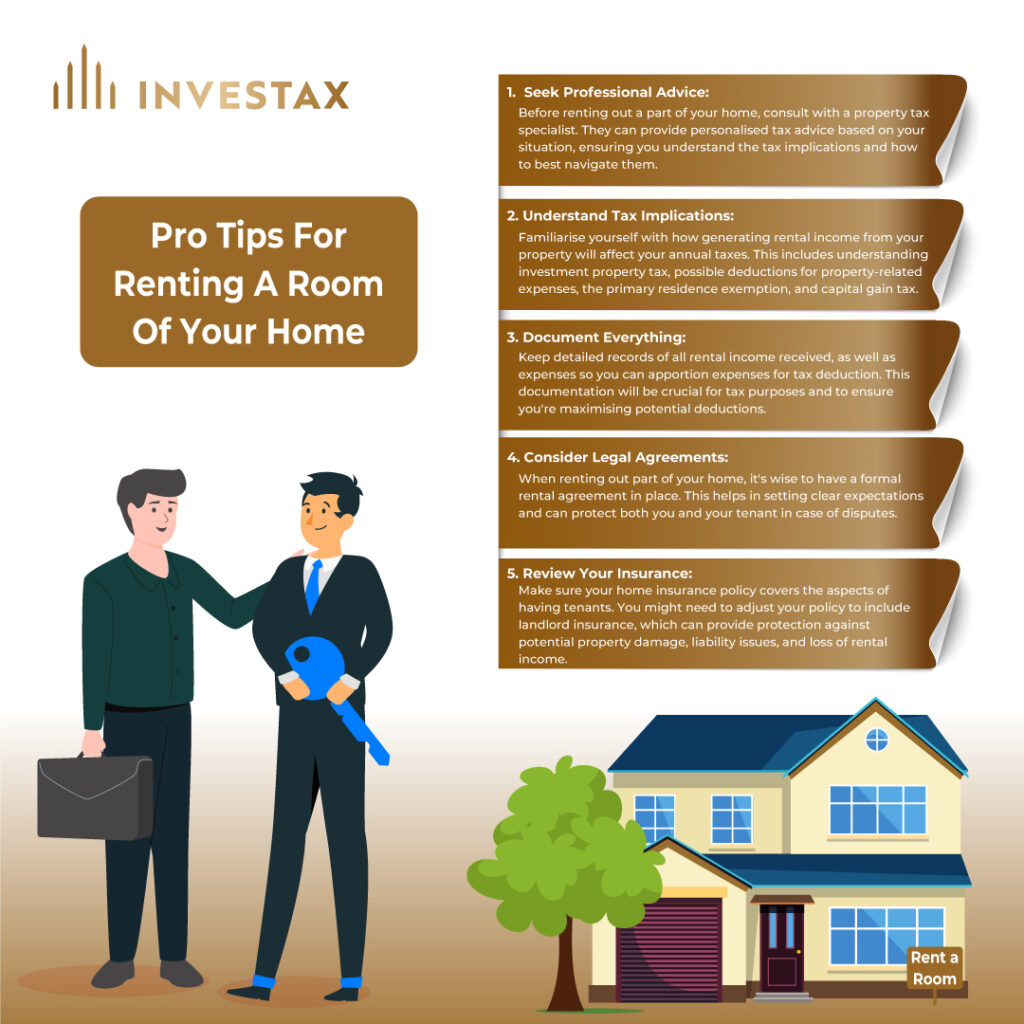Room Rental and Capital Gains Tax Liability
Are you looking for ways to make some extra cash? With inflation on the rise, our economy compels us to adopt innovative strategies to manage our financial commitments, such as mortgages. Many individuals are considering renting out a portion of their homes as a viable solution to generate additional revenue. If you’re considering this option, our case study will provide you with comprehensive insights into the tax implications of leasing a room in your property.

Overview – In this case study, we delve into the real estate journey of Michael, who acquired a property on July 1, 2018, for $700K, and made the strategic decision to sell it in January 2024 for $1.1M. Michaels annual income in 2024FY is $150K. Throughout the entire period of his ownership, this property served as Michael’s principal place of residence (PPOR). As a forward-thinking investor, Michael, who was single at the time, chose to rent out a portion of his home.
This decision was driven by his desire to accelerate his loan repayments and maximise the investment potential of his property. Ultimately, Michael’s decision to sell was influenced by personal milestones, as he aimed to purchase a new home with his partner and move in together. Michael’s partner, who works at the ATO, realised that this arrangement could have unique tax implications and suggested that he speak with an experienced tax accountant. Consequently, Michael reached out to Investax Group to assess his situation and understand the tax implications of the sale.
Findings – Michael rented out a room, constituting 20% of his house. The tenants also had access to common areas such as the living room, bathroom, laundry, and kitchen, which accounted for approximately 15% of the property. Michael reported rental income and claimed deductions for 35% of the expenses, including loan interest, rates, and taxes, on an annual basis. Given that the property served dual purposes as both his primary residence and an income-producing asset, Michael would not be eligible for a full primary residence exemption on his property.
Result – Given Michael’s qualification for a partial exemption on his Principal Place of Residence (PPOR), he will incur capital gains tax for renting out 20% of his house and for the tenants’ use of an additional 15% of the common areas. The capital gain calculations are outlined as follows:
- The total Capital Gain is $400,000, derived from the sale price of $1,100,000 minus the purchase price of $700,000.
- 35% of this Capital Gain, amounting to $140,000, is attributable to the portion of the property used for income generation.
- Since the property served as both his primary residence and an income-producing asset until the sale, there was no need to break down the capital gain based on usage over time.
- Having held the property for over 12 months, Michael is entitled to a 50% discount on the capital gains tax.
Was it worth it: The decision to rent out a part of your home can be deeply personal and varies significantly based on individual circumstances, lifestyle preferences, and financial goals. For someone like Michael, the financial aspect is a key factor but not the only consideration. The immediate cash flow benefits and the ability to manage living expenses more comfortably could very well justify Michael’s decision to rent out a part of his home.
However, as illustrated, navigating the tax implications of such decisions requires professional insight. If you’re planning a similar use of your home and wish to ensure that your financial and tax planning is both effective and compliant, the Investax Group is here to guide you through the process. Our team of experienced tax accountants can provide you with personalised advice tailored to your unique situation. Contact the Investax Group today to secure your financial future while making the most of your home’s potential.
Pro Tips –
- Seek Professional Advice: Before renting out a part of your home, consult with a property tax specialist. They can provide personalised tax advice based on your situation, ensuring you understand the tax implications and how to best navigate them.
- Understand Tax Implications: Familiarise yourself with how generating rental income from your property will affect your annual taxes. This includes understanding investment property tax, possible deductions for property-related expenses, the primary residence exemption, and capital gain tax.
- Document Everything: Keep detailed records of all rental income received, as well as expenses so you can apportion expenses for tax deduction. This documentation will be crucial for tax purposes and to ensure you’re maximising potential deductions.
- Consider Legal Agreements: When renting out part of your home, it’s wise to have a formal rental agreement in place. This helps in setting clear expectations and can protect both you and your tenant in case of disputes.
- Review Your Insurance: Make sure your home insurance policy covers the aspects of having tenants. You might need to adjust your policy to include landlord insurance, which can provide protection against potential property damage, liability issues, and loss of rental income.
Reference –


